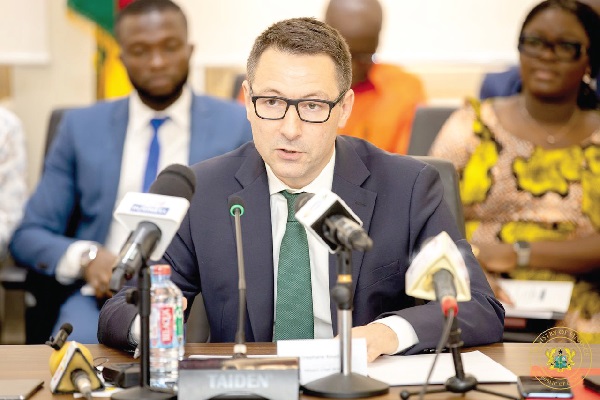
IMF conditions fund disbursement on agreement with bilateral creditors
The government must formalise its agreement with the bilateral official creditor committee (OCC) before the Executive Board of the International Monetary Fund (IMF) will approve the second review of the three-year extended credit facility (ECF) programme with the fund, senior IMF officials have said.
The Board approval, expected in June this year, would trigger the release of the third tranche of $360 million in IMF funds.
This follows the successful second review of the three billion dollar programme by the IMF staff, which has led to the country reaching a staff-level agreement with the fund.
The Second Review was based on key performance indicators, including six Quantitative Performance Criteria, three Indicative Targets, and one Structural Benchmarks that was due at the end of December 2023 and four Structural Benchmarks due at the end of March 2024.
Although the government reached an agreement with the OCC, which is co-chaired by France and China, in January this year under the G20 Common Framework on a comprehensive Debt Treatment Beyond the Debt Service Suspension Initiative (DSSI), the fund expects the government to formalise this agreement through the signing of a memorandum of understanding (MoU).
Speaking at a joint press conference by the IMF and the Ministry of Finance, Minister of Finance Dr Mohammed Amin Adam said the government was confident of signing the MoU with the OCC soon to enable the Executive Board of the IMF to sit in June to approve the second review of the programme to unlock the $360 million financing.
Following the formation of the OCC in May 2023, the Executive Board of the IMF immediately approved Ghana’s three-year IMF programme. It immediately released the first tranche of US$600 million to the country.
The second tranche of another US$600 million was hinged on the first review of the country’s IMF programme in October 2023. On October 6, the IMF staff and the government reached a staff-level agreement on the first review.
However, an Executive Board level approval which will trigger the release of the money was not possible until the government reached an agreement with the OCC.
The signing of the MoU will, however, represent the final step in the debt restructuring discussions with the OCC, as the government seeks to restructure debts of about $5.4 billion owed to bilateral creditors.
Reaching an agreement with OCC
The IMF Mission Chief for Ghana, Stéphane Roudet, for his part, said it was important for the country to finalise its agreement with the OCC and get the MoU signed.
He said the government must push for a deal consistent with the programme's objective and parameters with the fund. ‘Very good progress is being made and we are confident that the timelines will be met to enable the Board to sit in June,” he stated.
Commenting on Ghana’s performance, he said performance under the IMF-supported programme had been generally strong, with most quantitative targets met.
He said good progress had also been made on the key structural reform milestones, with the authorities’ policies and reforms to restore macroeconomic stability and debt sustainability while laying the foundations for stronger and more inclusive growth already generating positive results.
He, however, noted that there was still much ground to be covered and plenty of work ahead.
“We are, however, optimistic because the reform policies are already yielding positive results,” he stated.
Progressing well
The Governor of the Bank of Ghana, Dr Ernest Addison, also added that the country had shown steadfast commitment to a set of policies right from the beginning under very difficult circumstances, and has now reached a stage where programme implementation is progressing well.
He said with substantial progress in the measures implemented so far, the country was beginning to reap substantial macroeconomic dividends. “Inflation has dropped significantly from a peak of 54 per cent at the end of 2022 to 23 per cent in 2023.
The exchange rate remained relatively stable throughout last year, supported by tighter monetary policy and stronger foreign exchange reserves.
“Economic growth surprised on the upside. During the first quarter of this year, this progress has continued, although we have witnessed some slowdown in the pace of disinflation primarily due to a variety of factors including adverse base drift effects,” he stated.
He said the expectation, however, was for the disinflation process to resume in the second quarter of 2024 and beyond, driven by continued maintenance of a tight monetary policy stance.